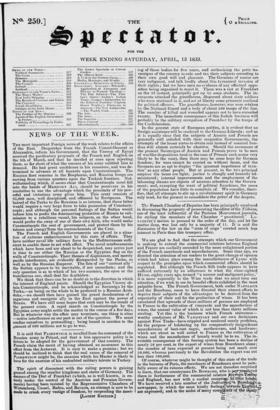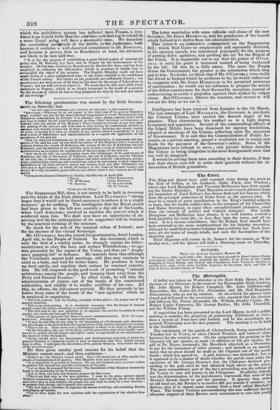We are glad to find that the attempts which our
Government is making to extend the comtnercial relations between England and France are cordially seconded by the more enlightened portion of the French merchants and manufacturers. Some time ago, We directed the attention of our readers to the great change of opinion which had taken place among the manufacturers of Lyons with respect to the principles' upon which commercial affairs should he regulated. But although the French Silk trade appears to have suffered extremely by an adherence to what the clear-sighted HUME, eighty years ago, termed "a narrow and malignant policy," it is more especially to the Wine trade that we must turn our attention, if we wish to see its baneful effects exhibited in the most palpable form. The French Government, both under NAPOLEON and the Bourbons, seem to have directed their utmost efforts to deprive their subjects of the advantages to be derived from the superiority of their soil for the production of wines. It has been calculated that upwards of three millions of persons are employed in France in the cultivation of vineyards and the manufacture of wines, the annual value of which is not less than thirty millions sterling. Yet this is the business which French statesmen— worthy coadjutors of Mr. VANSITTART and our own declaimers against Free Trade—have crippled and rendered nearly profitless, for the purpose of bolstering up the comparatively insignificant manufactures of beet-root sugar, earthenware, and hardware: which are about as well suited to France as the cultivation of wines and the manufacture of brandy would be to us. The in- evitable consequence of this forcing system has been a decline of nearly 50 per cent. in the export of wines from Bourdeaux alone; the number of tuns exported at present being not much over 50,000, whereas previously to the Revolution the export was not less than 100,000. Of course, whatever might be thought of this state of the trade in the bureaus of Paris, the merchants of Bourdeaux must be pain- fully aware of its ruinous effects. We are not therefore surprised to learn, that our countryman Dr. BOWEING, who is pikwmplo ,ed there in furtherance of the commercial relation yetyieen2E* and England, has met with a cordial receptiou,■..*Illkir We have received a late number of the Intlicatfing,*it newspaper, in which the most kindly feeling 'Isiviards'4ii %1St are expressed; and. in the midst of many comaintret The • which the prohibitory system has inflicted upon France, a con- fident hope is held forth 'that the exertions noWmaking Ito establish a more liberal policy will have a successful issue. We 'translate the concluding pantograph. of thearticie in the Incileateur, both because it contains a well-deserved compliment to Dr. BOWRING, and because it proves, that in Bourdeaux at least, his advances are likely to be met half-way.
" It is for the purpose of establishing a more liberal system of commercial policy that AL Bowling has been sent to France by the Government of his sountry. He has been residing in Bourdeaux for the last few days, and has been employed in collecting the information 'which is necessary to enable him to =accomplish the object of his mission. The English Ministry could not have inade choice of a more enlightened man, or one better entitled to the confidence .sf the French nation. His claims on our gratitude are sufficiently known ; our • sountrymen are well aware of all that he has done for the cause ot Liberalism in 'France; and we will not here repeat it. We trust that he will meet with every 'assistance in France ; which is so deeply interested in the result of a mission :for. the success of which he has so long prepared the way by the zeal and talent 4f his writings."



















 Previous page
Previous page